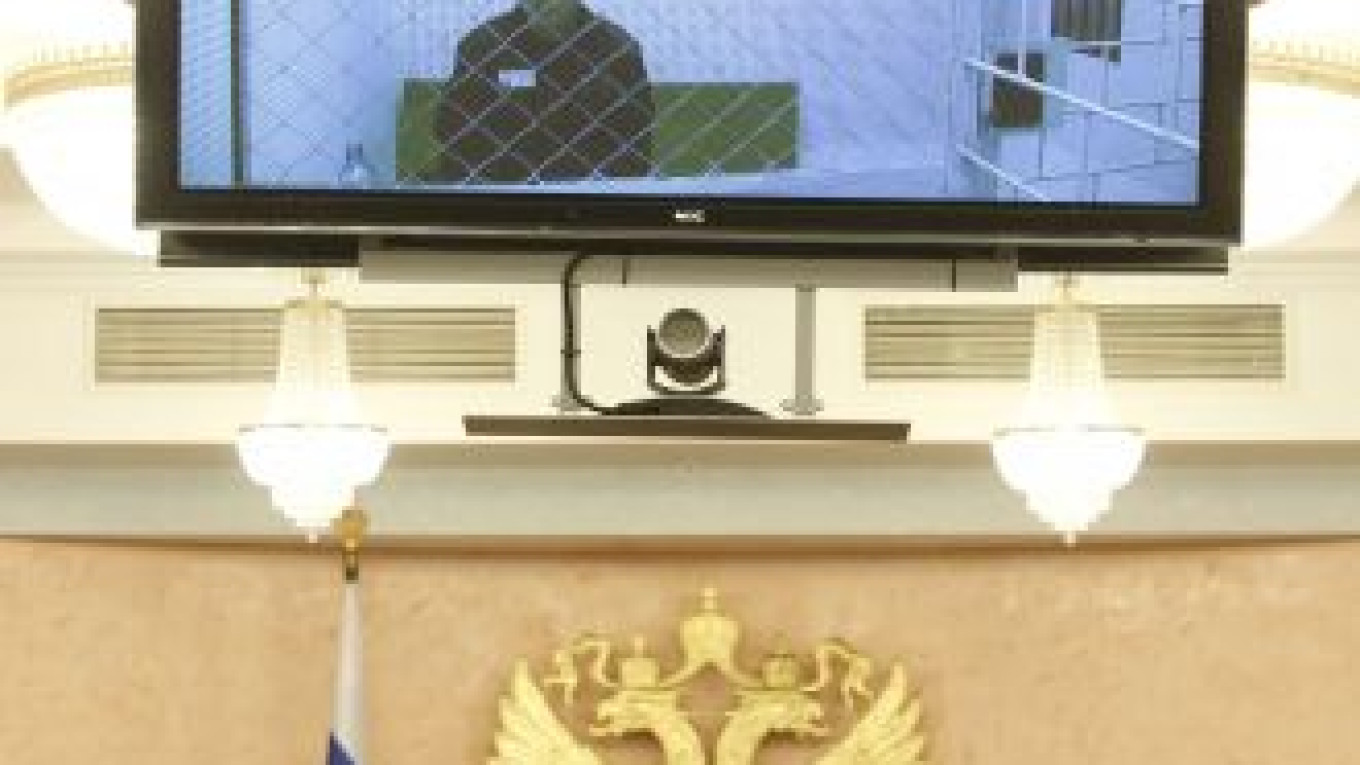The Supreme Court ruled Tuesday to cut the sentence of former oil tycoon and Yukos CEO Mikhail Khodorkovsky and his business partner Platon Lebedev by two months, but their supporters called the move a “pathetic gesture” and their lawyers promised to appeal the court’s decision.
Khodorkovsky and Lebedev were arrested in 2003 on fraud and tax evasion charges and convicted to nine years in prison in 2005 in a case that was widely seen as political punishment of Khodorkovsky for challenging President Vladimir Putin’s authority.
Five years later, the two were tried together again in a second case and convicted of stealing oil from Yukos and laundering the proceeds. Last December, the Moscow City Court reduced their sentence from 13 to 11 years after conducting a review, leaving them to be released in 2014.
In the latest review of the case, the Supreme Court examined the amount of oil stolen from Yukos according to materials from the second case, which was seen by many as more controversial than the first and was denounced by the international community, even prompting Amnesty International to label Khodorkovsky and Lebedev prisoners of conscience.
The pair’s lawyers called on the Supreme Court “to take a historic chance” on Tuesday and release their clients immediately, citing numerous inconsistencies in the second verdict, which said they stole oil from their own company.
“I won’t comment on the two months that the Supreme Court generously bestowed on them, proving that neither the law nor justice worked in this case, but we’re going to continue the struggle,” Vadim Klyuvgant, Khodorkovsky’s lawyer, said after the hearing, adding that he and Lebedev’s lawyers would likely appeal the decision to the Supreme Court’s Presidium.
In accordance with the Supreme Court’s decision, Khodorkovsky will be released next August and Lebedev next May.
Lebedev refused to participate in Tuesday’s hearing, and Khodorkovsky took part via video link from the town of Segezha in northwestern Russia, where he’s serving his term.
Khodorkovsky addressed the court from a small dark cell with a statement that cases such as Yukos had damaged Russia’s legal system and people’s trust in fair trials.
“I ask that the Supreme Court overturn this juridically illiterate verdict. I think it would be a disgrace if it were to be legitimized by a decision of the Supreme Court,” he said, calling the verdict “absurd” for saying he’d embezzled from himself. ?
The plaintiff at the hearing was represented by Federal Property Management Agency official Yulia Gunko, who, when asked by the judge whose interests she represented, said she represented the interests of the Russian Federation.
The defense lawyers told the court that the second verdict lacked enough evidence for a conviction,? pointing out numerous violations
“If you peel off all the layers of lies and debris from all kinds of trash, there is, and initially was, no grounds for even one day of punishment, let alone a decade,” Klyuvgant said.
Lebedev’s lawyer, Alexei Miroshnichenko, said the second trial was “an attempt to criminalize an ordinary business activity.”
The lawyers also cited a decision by the European Court of Human Rights from July that said the first trial was held with violations. The defense noted that if the first trial was found to be unjust, the second one was “lacking any logic or sense whatsoever.”
Although the hearing was held to review the quantity of oil stolen, the lawyers didn’t hold back from telling the court about contradictions in the second case and they challeneged the notion of fairness in Russia’s justice system.
“We didn’t say anything new to them, no matter how eloquently we spoke,” Klyuvgant said.
Khodorkovsky’s parents attended the hearing and said they were very disappointed with the court’s decision.
“There’s a feeling of injury. … I didn’t expect this, I thought they would say ‘This is it, freedom!’” said Khodorkovsky’s father, Boris. “But, of course, every day is important, so we’ll appreciate these two months too.”
Khodorkovsky’s mother, Marina, said she “didn’t expect anything anymore.”
“From the point of view of our country, this is a just decision,” she said. “But from my point of view, it was all unlawful from the very beginning, and the unlawfulness continues.”
Khodorkovsky’s supporters at the hearing called the decision a shame and said it was simply meant for show.
Speaking after the trail, Klyuvgant expressed doubt about Khodorkovsky’s release next year, hinting at growing suspicions over a third case against him.
Contact the author at e.kravtsova@imedia.ru
A Message from The Moscow Times:
Dear readers,
We are facing unprecedented challenges. Russia's Prosecutor General's Office has designated The Moscow Times as an "undesirable" organization, criminalizing our work and putting our staff at risk of prosecution. This follows our earlier unjust labeling as a "foreign agent."
These actions are direct attempts to silence independent journalism in Russia. The authorities claim our work "discredits the decisions of the Russian leadership." We see things differently: we strive to provide accurate, unbiased reporting on Russia.
We, the journalists of The Moscow Times, refuse to be silenced. But to continue our work, we need your help.
Your support, no matter how small, makes a world of difference. If you can, please support us monthly starting from just $2. It's quick to set up, and every contribution makes a significant impact.
By supporting The Moscow Times, you're defending open, independent journalism in the face of repression. Thank you for standing with us.
Remind me later.


